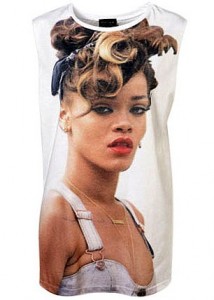A very recent English Court of Appeal decision shows the distinct approach of English courts to publicity rights (Fenty v. Topshop [2015] EWCA Civ 3).
In 2012, the fashion retailer Topshop began selling in its UK stores and through its website a fashion t-shirt showing a clearly recognizable image of Rihanna, the well known pop singer. The owner of copyright licensed the image to Topshop, but Topshop did not license rights from Rihanna. The image is below:

The Court of Appeal noted that Topshop had previously sold garments bearing images of famous persons, some of which had been authorised and some of which had not.
Topshop sold about 12,000 units of the Rihanna t-shirt between March and August 2012, at a price of £22. Initially the shirt was described online as the "Rihanna tank" and "photographic Rihanna motif tank", but by mid-March of 2012 those references to Rihanna had been removed, possibly because Rihanna is a registered trade-mark for clothing.
The Court noted that Rihanna had been active in the fashion sphere and exercised control over the garments she would wear. For example, in June 2011 she had entered into an agreement with Armani relating to a women's wear collection.
The trial judge found that Rihanna was regarded as a style icon, and that when consumers see Rihanna wearing an item of clothing they think it has been endorsed by her.
Topshop contended that the t-shirt was an item of fashion wear, and not a piece of promotional merchandise, and that consumers bought it simply because they liked the product and the image for their own qualities.
It was influential to the trial judge that Topshop and Rihanna had relationships in the past. This included a shopping competition in 2010 in which Topshop offered entrants a chance to win a personal shopping appointment with Rihanna at its flagship London Oxford Circus store. There was also a visit by Rihanna to Topshop in February 2012, which Topshop chose to publicise through Twitter, presumably to emphasize that Rihanna was wearing or thinking of wearing Topshop clothing. So the trial judge concluded that Topshop had recognized and sought to take advantage of Rihanna's position as a style icon.
The trial judge also found that the image on the t-shirt was significant as it was created during a video shoot for the "We Found Love" single, which was filmed in Northern Ireland, and received substantial press attention due to the risqué clothing that Rihanna was wearing, and because the owner of the land on which the video was recorded had complained about the shoot.
So it was a combination of the striking image, and Topshop's link with famous stars, including Rihanna, that led the trial judge to conclude that a substantial portion of purchasers would consider the product to have been authorized by Rihanna.
The Court of Appeal confirmed that under English law there is no specific legal right which allows a celebrity to control the use of his or her name or image (unlike much of Canadian and American law). A celebrity must therefore rely on passing off or other grounds.
Passing off protects goodwill, and prevents one person passing off his/her goods or services as those of another. To succeed in such a claim, the claimant must establish goodwill or reputation attached to the goods or services, that the defendant has made a misrepresentation so the public believes the goods or services are associated with the claimant, and the claimant must show damage because of the misrepresentation.
The Court of Appeal stated it by no means follows that simply because the name or image of a celebrity appears on a consumable commercial item that the public will assume it has been endorsed by that celebrity. Each case is to be considered on its own facts, and the claimant must show that the activities of the defendant amount to a misrepresentation that the celebrity has endorsed or approved the goods or services.
So it is entirely possible to sell t-shirts with images of celebrities in the UK, which may not meet the test for passing off.
At least two of the three Court of Appeal judges in this case described Rihanna's case as borderline, and noted that the trial judge relied on two key factors, namely Rihanna's past association with Topshop, and the distinctive features of the image which was used.
But the Court of Appeal affirmed the trial judgement which found that Topshop's activities amounted to passing off and which awarded an injunction prohibiting Topshop from dealing with the t-shirt further without informing potential purchasers that it had not been approved or authorized by Rihanna. Any monetary compensation is still to be determined, but already Topshop has been ordered to pay at least several hundred thousand pound sterling of Rihanna's legal costs.
While Rihanna achieved the remedy she wanted in this case, the "borderline" comments of the Court of Appeal do not make English law entirely celebrity friendly.
The content of this article is intended to provide a general guide to the subject matter. Specialist advice should be sought about your specific circumstances.

